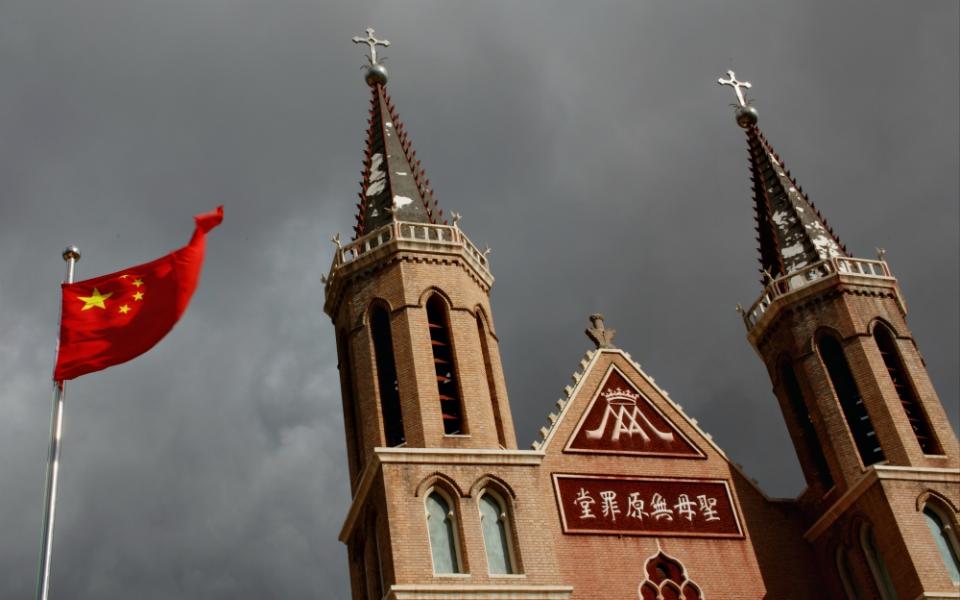Chinese priests: the new cross of 'registration'
Today we celebrate the Day of Prayer for Christians in China, instituted by Benedict XVI on the feast of Our Lady of Sheshan. This is an opportunity to celebrate communion with the Church in China but also to remember its sufferings. Speaking to AsiaNews, an underground priest explains the actual problems involved in joining the Patriotic Association that Beijing is trying to impose with increasing harshness in the wake of the 2018 Agreement with the Holy See.
Milan (AsiaNews) – Today, May 24, the Church celebrates the Day of Prayer for Christians in China, established by Pope Benedict XVI in 2007 to coincide with the feast of Mary Help of Christians, , particularly venerated in China, especially at the Shrine of Our Lady of Sheshan in Shanghai.
Today is an opportunity for Catholics around the world to renew communion with the churches in mainland China, but also to remember their sufferings and the problems that hamper freedom or religion in the country.
For this reason, AsiaNews is publishing a letter from an underground priest on a particularly delicate issue, that of official registration, which Chinese authorities now demand from all priests, relying on the 2018 Agreement with the Holy See on the appointment of bishops, which, however, does not require it.
Month after month, the pressures are mounting, especially in those provinces with still significant underground communities, whose members believe in good conscience that they should not join the Chinese Catholic Patriotic Association, which is under the influence of the control and ideology of the Communist Party of China.
In this letter, the clergyman explains in detail why registration is not just a formal act, but a very real problem for the exercise of his pastoral ministry. He also describes the difficulties that it entails in the life of a priest.
Once clergy choose to "register for transformation," which means joining the officially recognized Chinese Catholic Patriotic Association and the official system, they obtain a "legal status" under the law. However, in terms of pastoral work and religious conscience, they will face a series of complex challenges:
1. The Tear and Inner Conflict of Religious Conscience
- Struggle of Conscience
The Catholic Church emphasizes "freedom of conscience" and "loyalty to faith." Joining the Patriotic Association means accepting the leadership of an organization that is questioned by the universal Church.
For some priests, registering may feel like compromising with the authorities, leading to a sense of "betraying the faith," which is suppressed over time.
- The Ambiguity of Communion with the Pope
Although Pope Francis, for pastoral reasons, accepted the legitimacy of some "registered bishops," the Sino-Vatican agreement does not require priests to register.
Once registered, some priests may be misunderstood as "no longer loyal to the Holy See," leading to a gray area in their ecclesiastical identity.
2. Expanded Pastoral Space, but with Many Restrictions
- Publicly Leading Sacraments, but Activities are Controlled
Priests can hold Masses, preach, and perform sacraments in government-approved churches.
However, the content of their sermons must avoid sensitive topics like the authority of the Pope, the universal Church, religious persecution, and the underground Church's situation.
Churches are often equipped with cameras, and government personnel may attend and even intervene during sermons.
- Restricted Religious Freedom
Organizing activities, training sessions, and youth Sunday schools requires approval.
It is impossible to freely establish seminaries or groups for religious vocations.
Laypeople's preaching or leading prayers also requires official approval, limiting the space for lay collaboration in pastoral work.
- Constant Pressure to Renew Credentials
Clergy must continually undergo assessments for renewing their certification, leading to mental exhaustion.
3. Crisis of Trust within the Faithful Community
- Alienation from Underground Believers
Believers who have long adhered to the underground faith may view registered priests as "compromising or surrendering."
The familiar network of faithful may be disrupted, affecting the continuity of pastoral work.
- Complex Reactions from Official Believers
Some official believers accept registered priests but may remain ambivalent about their identity due to the complex history within the Church.
Facing rejection from both sides, registered priests may find themselves in a "lonely island" state.
4. The Pressure of "Re-Conversion" or "Self-Castration"
- Continuous "Cleansing" in Policy Advancements
Initial registration may simply be a "recording," but the government will continuously demand:
Attendance at political study meetings
Hosting "socialist core values" lectures
Emphasizing the slogan of the sinicization of religion
Cooperating with the dismantling of crosses, hanging of national flags, etc.
"De-sacralizing" church decorations and sermon language.
Each cooperation is a new "transformation," which may further dilute one's faith.
- Becoming a "Middleman" in the Political-Religious Struggle
Priests are forced to navigate between "stability maintenance" and "pastoral work."
Facing questions from the faithful and orders from the government, they are at risk of physical and mental exhaustion, as well as faith anxiety.
5. Long-term Ambiguity in Spirituality and Identity
- Inner Identity Crisis
Though "legally recognized," priests may feel their "religious identity is unclear."
They may experience a loss of meaning in their pastoral vocation, self-doubt, retreat, and even fatigue.
- Stagnation in Spiritual Growth
In order to "stay safe," priests may have to "self-censor."
They no longer dare to speak about religious vocations, encourage youth to join the priesthood, or preach the truth.
They gradually become "formalized and institutionalized," losing their prophetic role.
Summary: Registration is Not the End, But a New Cross
Priests after registration are in a very delicate state: outwardly legal, but inwardly facing spiritual challenges deeper than those of the underground church.
The questions they must face include:
- Can they hold firm to their faith without distortion?
- Can they shepherd the faithful without losing authenticity?
- Can they maintain conscience and witness within the system?
This is a path that requires immense wisdom, courage, and prayer to walk.







.png)










